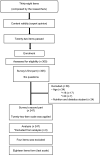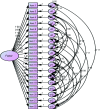Development of the scale of effects of social media on eating behaviour: a study of validity and reliability
- PMID: 32200764
- PMCID: PMC10200371
- DOI: 10.1017/S1368980019004270
Development of the scale of effects of social media on eating behaviour: a study of validity and reliability
Abstract
Objectives: The aim of the current study is to develop a valid and reliable instrument with psychometric qualities to measure effect of social media usage on eating behaviour in university students.
Design: A thirty-eight-item draft scale developed by the researchers. After content validity, twenty-two items are remained and was used to collect the data. In the analysis of the data, confirmatory factor analyses were performed to test construct validity. For the reliability of the scale, Cronbach alpha coefficient was calculated for the whole of the scale.
Setting: The participants attended from various departments of different universities in Ankara.
Participants: The scale was administered to the study group consisting of 247 university students.
Results: Four items that had total correlation value less than 0·40 were removed from scale. The reliability coefficient of the whole eighteen-item scale was found to be 0·928.
Conclusions: It has been shown that the scale developed as a result of the validity and reliability analyses performed for the scale is a valid and reliable measurement tool and can be used in studies.
Keywords: Eating behaviour; Oral control; Reliability; Social media; Validity.
Figures
References
-
- Littleton HL & Ollendick T (2003) Negative body image and disordered eating behavior in children and adolescents: what places youth at risk and how can these problems be prevented? Clin Child Fam Psychol Rev 6, 51–66. - PubMed
-
- Aslan P (2011) New trends in public relations: social media. Master’s Thesis, University of Marmara.
-
- Raacke J & Bonds J (2008) MySpace and Facebook: applying the uses and gratifications theory to exploring friend – networking sites. Cyberpsychol Behav 11, 169–174. - PubMed
-
- Ülke Z, Noyan OC & Dilbaz N (2017) Validity and reliability of the Turkish version of the Bergen Facebook addiction scale among university students. Curr Addict Res 1, 16–25.
Publication types
MeSH terms
LinkOut - more resources
Full Text Sources



